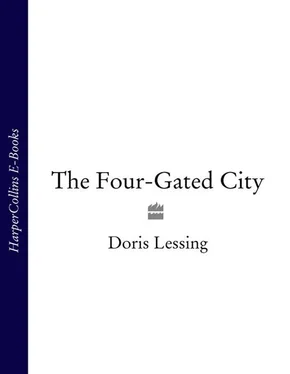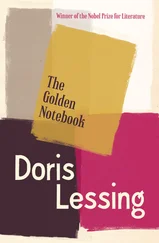Against the dim muslin that screened the café, shapes of bodies; the lively intimacy of the early morning session shed warmth on to the pavement. She was too early after all. Martha went around into the side street where, this house being on a corner, was a side door into a yard. The door was of slats of wood held with two cross-boards. It had been painted once, for there was crumbling greenish pigment in the cracks. But now it was a greyish colour. ‘From before the war,’ Iris had said. When Iris said something was from before the war, this meant, something that would have been replaced, or mended or painted, if there had not been a war. She would not, for instance, have said that the wall which was a single yellow brick’s thickness surmounted at the height of a tall man’s head by a litter of broken glass, was from before the war. Martha unlatched the door and was in – a neat, tended garden. Hidden behind these street fronts, tucked in among wastes of brick and cement, were gallant little gardens. This one, the size of a large room, had a pear tree, an old wooden bench recently painted a new bright green by Jimmy; and an ancient rose ambled over the back of the house. It was in full pink bloom and it scented all the air. In the corner of this patch of garden was a privy: the house did not have an indoor lavatory. It was like a little sentry box, and to it was a flagged path with musky plants growing in crevices. Beyond the window into the kitchen, Iris sat, at a table framed by pink roses. When she had finished with the early morning stint, she took what she said was a bit of a kip: she slumped in a tortoise condition, her hand stretched towards a flagon of tea, her eyes open, but not really seeing anything. Meanwhile Jimmy had got up and had taken over the café. He was not in the kitchen now. Martha pushed open the back door and was received by a sleepy stare from the surface of Iris’s eyes. Then, she said vaguely, ‘Oh, it’s you.’ Martha sat down, and Iris gestured towards a brown teapot and yawned. ‘We’ve used your ration,’ she said. ‘You didn’t come, did you?’ Martha poured tea. Iris smiled: but she resented being made to wake up.
The kitchen was small. Along one wall was apparatus for the café: the frying machine for the fish and the chips; and an electric stove which Jimmy had filched from the ruins down the road after the bomb had fallen. There was also an old-fashioned wood stove, which was used as a cupboard, or larder.
‘So you’re off?’ said Iris.
‘Yes. I’ve come to get my things.’
‘They’re ready. And I’ve put your ration book and your coupons on your case. Upstairs.’ ‘Thank you, Iris.’
‘Stanley’s next door, if you want to see him.’ Martha had not wanted to see Stanley, evidence of her bad heart though this undoubtedly was; and Iris’s tone said that see him she ought, even if Stanley did not particularly want to see her. But now, since it was clearly up to her to go through and make her presence known to the man whom Iris had decided would suit her as a husband, Martha actually got as far as the door before rebelling. Why should she? Whatever debts she would leave behind her, Stanley was not one of them. She sat down again, in silence. The two women confronted each other: Martha determined not to apologize, plead guilty, or evade, Iris now awake, exuding a stubborn determination to suffer betrayal.
‘I don’t think Stanley and I are suited,’ said Martha.
‘Well, I suppose one of these days he’ll make his bed,’ said Iris, full of grievance.
‘Yes, but not with me,’ said Martha.
Iris measured herself a small sour glimmer in reply to this invitation to laugh; and then, against her will, laughed out, and slammed her hand palm down on the table.
She continued to laugh, laughter ebbing from her like water: it was like crying.
‘Ah,’ she said, ‘but a man’s a man, and when the war’s out of his blood, he’ll settle well enough.’
According to Iris, Stanley had been uprooted by war; which was why he had chosen the lorry run to Birmingham five days a week, and spent weekends doing labouring work – he couldn’t rest. Martha thought it was nothing to do with the war, it was his nature. And she knew, though Iris did not (for she and Stanley had come to an understanding, had made a pact against matchmakers) that there was a woman in Birmingham with whom he spent nights. He did not want to marry. Certainly not Martha. Though he liked her well enough to suggest a job as secretary to the firm he worked for.
Iris now got up, defying Martha, or, more likely, asserting her right to choose her cousin a wife; and called through the hatch: ‘She’s here!’
She sat down again, saying to Martha, ‘You’ll want to say goodbye, won’t you then?’
In a moment Stanley came in. He was about forty, a lean, narrow, slouching man with hard blue eyes.
‘I’m due to be off,’ Stanley said generally. ‘My mate’s already at the bus. So you’ve got yourself a job then, have you?’ He did not look at Martha but at his cousin: and towards her a warning, or a resentment, was directed. Not at Martha: he was a fair man and proud of it.
‘Yes, I think so,’ said Martha.
‘You’re all right then,’ said Iris, hostile.
‘See you some time,’ said Stanley, and, on his way out, turned to give her a good warm smile, snubbing Iris with a cool nod.
‘He’s a case,’ said Iris, grieving. ‘There was a girl at the laundry who fancied him, but not him no.’
‘How do you know he hasn’t got a girl of his own already?’
‘Well, if he’d do a thing like that!’ said Iris bitterly, highlighting for Martha some area of family grievance, bonds, or bondage, that she’d never now, with the time left, be able to understand. Tears were in Iris’s weak blue eyes, and she stirred her tea savagely.
In came Jimmy, wearing a striped apron, full of a contained reproach.
‘So you don’t want that job, then?’
‘She’s got a job,’ said Iris. ‘Up West.’
‘Up West is it?’
‘I don’t know yet,’ said Martha.
‘Then you don’t need any job we can get you, do you then?’ He took a big scrubbing brush and went back into the café, saying, ‘Want some breakfast, help yourself if you do.’
On the shelf over the old wood stove were set out the week’s rations. Each person’s separately: that week’s four ounces of butter, three times, the bacon and two eggs each, on a big dish. And tea. Martha’s had gone.
Iris watched Martha out of a practised interest in the unfairness of the world, to see if she would take eggs, butter, bacon. Martha did not like the butter anyway: a hard salty grease. But Iris had a large china bowl of dripping, the aromatic distillation of a dozen Sunday dinners.
‘Oh, you’re back to my dripping?’ said Iris, friendly again; and she smiled as Martha fried bread in the delicious crumbling scented fat, for herself, for Iris, and they sat eating and drinking tea while the sound of Jimmy’s scrubbing brush went on next door.
He did not come back in: he was not going to forgive her. Martha said good-bye to Iris; was invited to drop in when she felt inclined; and she went upstairs while Iris joined Jimmy in the café.
In the minute room which was already cleaned and impersonal, over the café, her case stood ready for her near the door, with the ration book on it. She took out a summer dress, bundled Mrs Van’s coat and the sweater and skirt into the case; and prepared for the summer day which it was fairly doubtful that the day would remain. She left through the little rose-scented garden.
In was ten in the morning. In the great buildings along the river that administered London, men and their secretaries arrived for work. In three hours, the feeling of the city had changed. The great market that was London had opened: a dispersed, scattered, diversified market, so that in every street was a corner, a block, a centre, where it seemed as if wealth had swum together just here, to offer concealed money, furs, carpets, silver, gold, robes, but like icebergs, only a fraction of them visible in a sign of the name of a banker, or the glass case full of embroideries, or luscious furs; for above all, it was a sense of hidden wealth: and walking over the damp grey pavements it was to feel that under one’s feet stretched invisible warehouses of luxury and richness and beauty – miles of them, caverns of them. And, to the dealers and merchants who owned them, it was not important to sell, or to display, or to offer. A secret city. A hidden city. And, if instead of walking past doors, showcases, the proffered sample, one pushed open a door, passed the rather inferior items for sale, or challenged an inner door, which only needed to be pushed, for so little did the owners expect temerity on the part of docile customers that there was no doorkeeper and – suddenly, hey presto! a great descending stairway to the underground city beneath London where were stored for miles and miles the most fabulous carpets and tapestries and silks in the world.
Читать дальше












